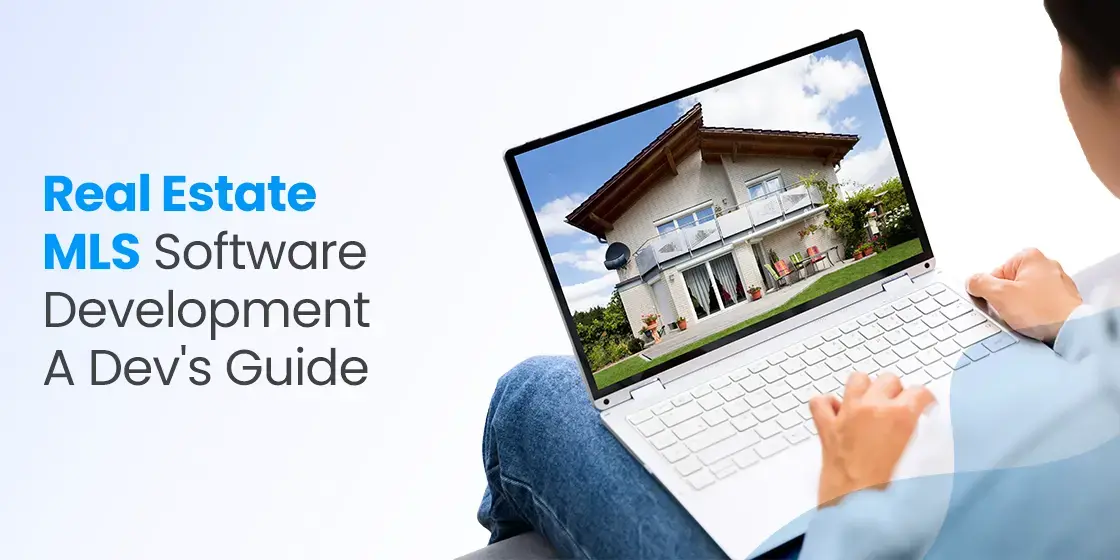Table of Content
Discover What Real Estate MLS Software Development Process Entails
The real estate industry is undergoing a digital transformation, fueled by technological advancements and evolving consumer expectations. At the heart of this transformation lies the Multiple Listing Service (MLS), a crucial tool for real estate professionals. Modern MLS systems leverage technology to enhance efficiency, increase market transparency, and improve the overall real estate experience.
Traditionally, these functions were often facilitated through manual processes, leading to inefficiencies and information disparities. The advent of real estate MLS software development revolutionized this landscape, creating a centralized hub for property information, facilitating collaboration among real estate professionals, and streamlining the entire transaction process.
Today, MLS systems are far more than just property listing databases. They have evolved into sophisticated platforms that utilized advanced technologies such as artificial intelligence, machine learning, and big data analytics to provide valuable insights, enhance market transparency, and improve the overall user experience.
Join us as we explore the intricacies of developing cutting-edge real estate MLS software with the help of custom software development services. We will also explore key considerations and essential features for success in today’s market. Let’s begin.
Understanding MLS In Real Estate – What is It?

A Multiple Listing Service (MLS) is a shared database of real estate properties for sale or rent. It serves as a central repository of property information, including details such as address, price, property type, number of bedrooms and bathrooms, and photos.
Key features of a modern MLS system include:
- Property Listings: Comprehensive and accurate property listings with detailed descriptions, high-quality photos, and virtual tours.
- Search Functionality: Advanced search filters that allow users to easily find properties that meet their specific criteria, such as price range, location, property type, and desired features.
- Agent Collaboration: Tools that facilitate collaboration among real estate agents, such as shared notes, communication tools, and scheduling features.
- Market Data Analysis: Data analytics and reporting tools that provide valuable insights into market trends, property values, and buyer behavior, showing the role of AI in real estate industry.
- Lead Management: Tools for managing leads, tracking client interactions, and nurturing relationships with potential buyers and sellers.
- Communication Tools: Integrated communication tools, such as email and messaging, to facilitate communication between agents, brokers, and clients.
- Security and Compliance: Robust security measures to protect sensitive data and ensure compliance with relevant regulations.
MLS systems play a crucial role in the real estate market by:
- Improving Market Transparency: Providing access to comprehensive and accurate property information, enabling buyers and sellers to make informed decisions.
- Increasing Efficiency: Streamlining the property search and transaction process, saving time and effort for both agents and clients.
- Enhancing Collaboration: Facilitating communication and collaboration among real estate professionals, leading to smoother and more efficient transactions.
- Driving Market Growth: By providing a platform for showcasing properties and connecting buyers and sellers, MLS systems contribute to a more vibrant and dynamic real estate market.
Why Do Real Estate Businesses Use MLS Systems?

The ideal MLS systems like the ones on the market currently offer numerous benefits for real estate professionals, including:
- Increased Visibility: Listing properties on the MLS provides maximum exposure to potential buyers, increasing the chances of a quick sale.
- Access to Market Data: MLS systems provide access to valuable market data, including property sales history, market trends, and competitor activity. This data can be used to make informed pricing decisions, identify market opportunities, and provide valuable insights to clients.
- Enhanced Collaboration: MLS systems facilitate collaboration among real estate agents, enabling them to share information, coordinate showings, and work together to close deals.
- Improved Efficiency: By automating many of the tasks involved in the property selling process, MLS systems can significantly improve efficiency and productivity for real estate professionals.
- Competitive Advantage: Access to the MLS gives real estate professionals a competitive edge, allowing them to provide better service to their clients and close more deals.
In today’s competitive real estate market, access to an MLS with your property management software is essential for success. It provides real estate professionals with the tools and resources they need to effectively serve their clients, stay ahead of the competition, and thrive in the evolving real estate landscape.
Real Estate MLS Software Development – What Are the Top Features to Incorporate?

Developing a successful real estate MLS software requires careful consideration of the specific needs and requirements of the target audience. By incorporating these features, developers can create cutting-edge MLS software that meets the evolving needs of the real estate industry and provides real value to its users.
Here are some of the top features to incorporate when opting for MLS software development:
- User-Friendly Interface:
The software should be intuitive and easy to navigate, with a clean and uncluttered interface.
- Powerful Search Functionality:
Advanced search filters, including map-based searches, should allow users to easily find properties that meet their specific criteria.
- Comprehensive Property Listings:
The system should allow for the creation of detailed property listings, including high quality photos, videos, virtual tours, and comprehensive descriptions.
- Data Security and Privacy:
Robust security measures are essential to protect sensitive data, such as client information and financial details.
- Mobile Accessibility:
The system should be accessible via mobile devices, allowing agents to access property information and manage their business on the go.
- Integration with Third-Party Applications:
The ability to integrate with other real estate tools and platforms, such as CRM systems, marketing automation tools, and payment gateways.
- Advanced Analytics and Reporting:
The software should provide robust analytics and reporting features, allowing users to track key performance indicators, analyze market trends, and gain valuable insights into buyer behavior.
- AI-Powered Features:
- AI-powered property valuation tools: To provide accurate property valuations and assist in pricing strategies.
- Predictive analytics: To forecast market trends and identify potential opportunities.
- Chatbots: To provide instant support to users and answer common questions.
- Virtual Reality/Augmented Reality (VR/AR) Integration:
- VR/AR property tours: To provide immersive virtual experiences for potential buyers.
- AR-based property measurements and visualizations: To help buyers visualize furniture placement and make informed decisions.
- Collaboration Tools:
- Secure messaging and communication platforms: To facilitate communication between agents, brokers, and clients.
- Shared document repositories: To enable seamless sharing of documents, such as contracts and disclosures.
- Calendar and scheduling tools: To coordinate appointments and schedule showings.
- Customer Support:
- Comprehensive customer support: Including online documentation, FAQs, and dedicated customer support channels, such as phone, email, and chat.
- Regular software updates and maintenance: To ensure the system remains up-to-date, secure, and reliable.
Conclusion
The nuances of modern real estate MLS software development requires a deep understanding of the industry, a focus on user experience, and a commitment to innovation. By incorporating cutting-edge technologies, such as AI and VR/AR, and focusing on features that enhance collaboration, streamline workflows, and provide valuable insights, developers can create powerful tools that transform the way real estate professionals work and help them better serve their clients. The future of MLS systems lies in continuous innovation and adaptation. As technology continues to evolve, we can expect to see even more sophisticated and integrated solutions that leverage the power of data, AI, and emerging technologies to revolutionize the real estate industry.
Empower your digital initiatives with BariTechSol, a premier custom software development company. Our skilled team tailors cutting-edge solutions to your unique needs. Elevate your tech experience and stay ahead in the digital realm. Partner with BaritechSol and code the success of your next big idea.


